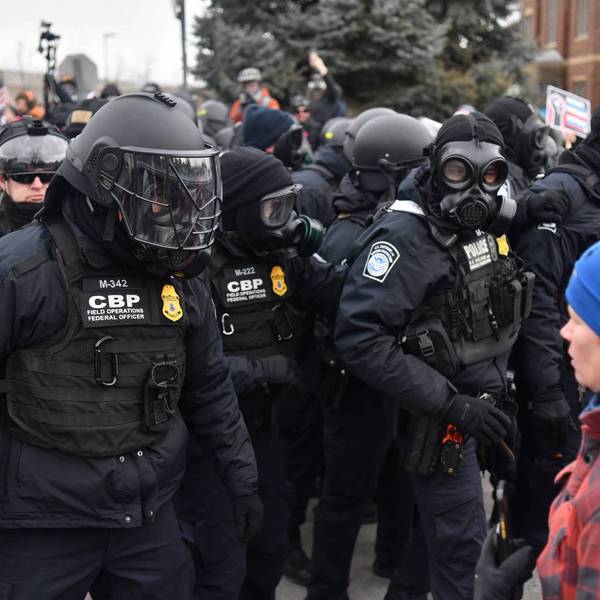The American press must not be complicit as President-elect Donald Trump attempts to neutralize and game the fourth estate, critics said this week.
"Rather than doing their jobs and being adversarial to Trump, rather than responding to this sort of bullying with some dignity and return aggression, it is a very good bet that they will respond with greater submission."
--Glenn Greenwald, The Intercept
From his unusual "off-the-record" summit with corporate media executives and reporters at Trump Tower on Monday, to his on-again, off-again meeting with the New York Times, to his employing scripted video briefings in place of press conferences, Trump has in the past two days further exhibited his disdain for, and willingness to sidestep, the establishment press.
Even before the election, the Huffington Post's Michael Calderone wrote: "With executive power at his disposal, and a reputation of retaliation, it is not a stretch to imagine Trump disrupting the press' traditional--and vital--role of covering the White House."
Recent developments suggest that prediction is coming to pass, as observers pointed out online:
Notably, the drama between Trump and the media "is unfolding at a keen moment of weakness for the press, which has already been buffeted by falling revenue and mounting public disaffection," Emily Bazelon writes in a piece for this week's New York Times Magazine.
She explains:
Only 40 percent of the public--the lowest rate since at least the 1990s--trusts the media "to report the news fully, accurately and fairly," according to a Gallup survey conducted in September 2015. This mistrust has been growing for a long time, but it was stoked by Trump during the campaign. He called the reporters who covered him "scum" and whipped up yelling and booing crowds. There is no consensus among his supporters that the press should hold those in power accountable. A recent Pew survey found that only half of Trump backers agreed that it was important in a strong democracy that "news organizations are free to criticize political leaders."
News organizations aren't doing themselves any favors in this regard, Glenn Greenwald wrote Tuesday at The Intercept, excoriating the "media stars and network executives" who agreed to Monday's off-the-record meeting with Trump in the first place.
"If you're a journalist, what is the point of speaking with a powerful politician if you agree in advance that it's all going to be kept secret?" Greenwald wrote. "Do they not care what appearance this creates: the most powerful media organizations meeting high atop Trump Tower with the country's most powerful political official, with everyone agreeing to keep it all a big secret from the public? Whether or not it actually is collusion, whether or not it actually is subservient ring-kissing in exchange for access, it certainly appears to be that."
Furthermore, Greenwald added, considering their subject, members of the press need to develop thicker skin. "The media was quite critical of Trump, and he hates them back," he wrote. "If they don't want to be disliked by powerful politicians--if confronting hostility of this type traumatizes them this way...then they should go find other work."
"This is a moment of high danger for the press; we're heading into a dark period for American democracy and American journalism."
--Jay Rosen, New York University
And he expressed pessimism that corporate media outlets will respond to this or other affronts with sharper teeth, citing one journalist who said after the "unprecedented" meeting with Trump: "I know I will get over it in a couple of days after Thanksgiving."
"Rather than doing their jobs and being adversarial to Trump, rather than responding to this sort of bullying with some dignity and return aggression, it is a very good bet that they will respond with greater submission (the way they all stayed passively in their assigned press pens during Trump rallies)," Greenwald wrote. "The supreme religion of the U.S. press corps is reverence for power; the more Trump exhibits, the more submissive they will get."
(Perhaps proving the point, Media Matters reported Tuesday that despite "multiple new reports highlighting potential conflicts of interests" involving Trump and his businesses, "[b]roadcast morning news shows mostly ignored" the issue.)
And that's dangerous, the Guardian's Ed Pilkington argued Tuesday in a lengthy exploration of whether Trump's "tactics mortally wound[ed] the fourth estate."
According to Pilkington:
It's not just the lack of access, mocking and bullying that can be expected from President Trump. There's also the internal danger that the media will normalize his time in office under the cloak of traditional reverence for the presidency.
Contributors to the CJR's account of 2016 point out that a pattern of normalization was established even on the campaign trail, when media outlets appeared to be willing Trump on to elevate himself from his startlingly unconventional approach to a proper "presidential" mode.[...]
So what will be the role of the "mainstream media" as it embarks, somewhat battered but still standing, into Trump's America? Will it be to document the new administration with a detached and "objective" eye, as traditional newsroom canons dictate, or will it pursue that other burning function of the fourth estate, holding power to account?
"This is a moment of high danger for the press," New York Univeristy journalism professor Jay Rosen told Pilkington. "We're heading into a dark period for American democracy and American journalism."



